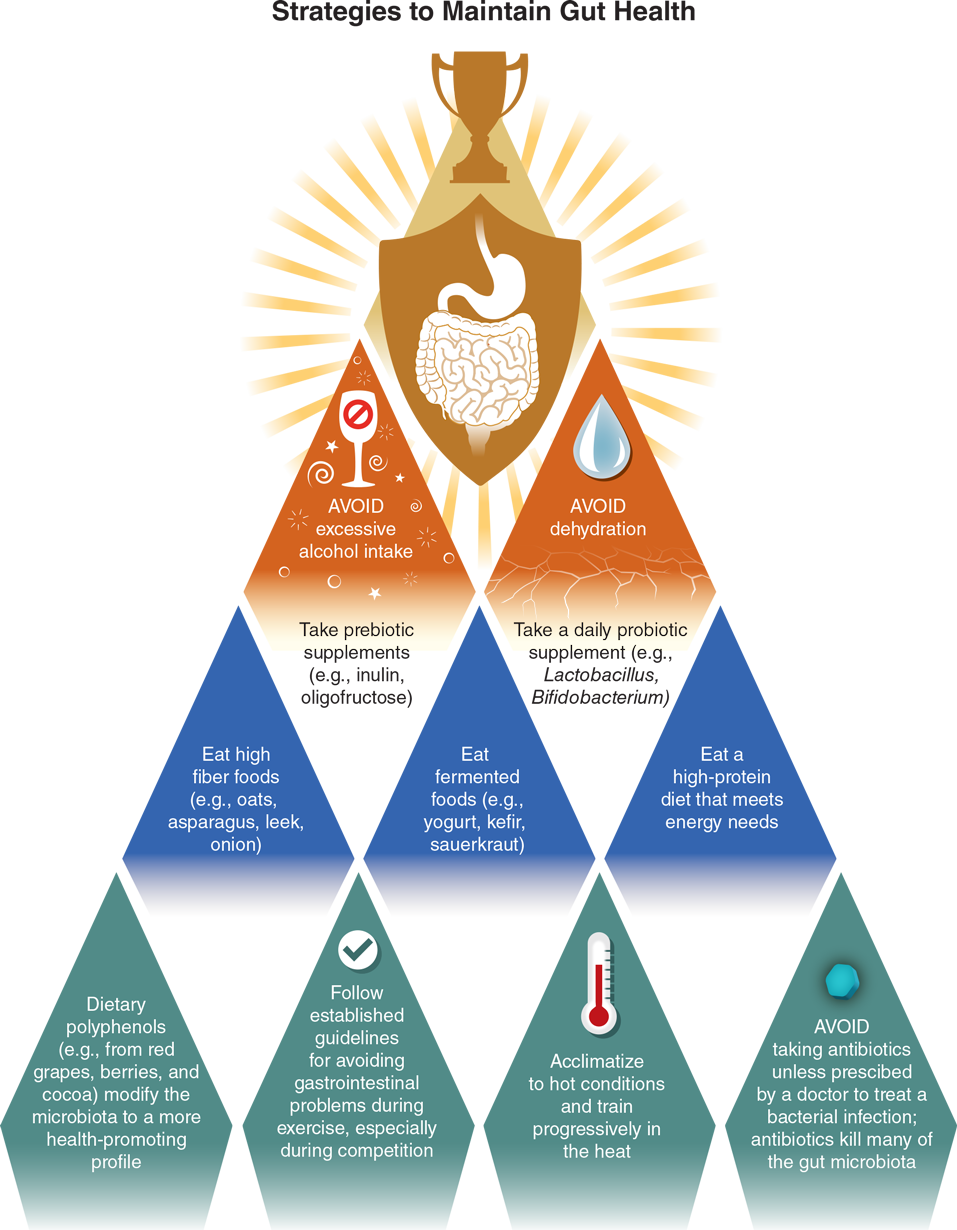Maintaining Gut Health
This is an excerpt from Sport Nutrition 4th Edition With HKPropel Access by Asker Jeukendrup,Michael Gleeson.
Good gut health is known to be important to our overall health. Fermented foods provide a rich source of microbes. Sometimes those microbes can affect the host, or they can make changes or produce metabolites that will affect the host microbiome (O’Brien et al. 2022a). Some probiotic supplements, especially natural strains that have been subjected to intensive investigation, can have beneficial effects (Jäger et al. 2019). Prebiotics, which are nutrients that encourage the growth of specific microbes in the gut, can also have beneficial effects (see the sidebar Probiotics, Prebiotics, and Polyphenols). Those fermented foods whose benefits are supported by research evidence can be good in any diet, including an athlete’s diet. Thus, both regular exercise and a healthy diet (i.e., high in protein, fiber, and plant polyphenols with the inclusion of some fermented foods or probiotic supplements) can contribute to healthy gut microbiota, which is important to overall gut health (O’Brien et al. 2022b).
Other ways in which athletes can help maintain their gut health include avoiding dehydration, acclimatizing to hot conditions, training progressively in the heat, and following established guidelines for limiting GI problems during exercise—especially during competition (infographic 5.1). Minimizing intake of antibiotic and antacid medications and avoiding excess alcohol consumption will also help to maintain gut health. Antibiotic drugs can kill a substantial portion of the gut microbiota, and when antibiotics have to be taken on the recommendation of a clinician to treat systemic or local bacterial infections, the daily ingestion of a probiotic supplement can reduce the risk of antibiotic-induced diarrhea and help to restore gut microbiota health (Rodgers, Kirley, and Mounsey 2013).

Although we often recommend eating less fiber in the hours or day(s) leading up to important training or events to reduce the risk of GI upset (see later section in this chapter), the athlete’s general diet on normal training days and particularly on low-load training days and rest days should be high in plant sources of soluble fiber and protein. These nutrients, both of which are incompletely digested in the small intestine, provide the gut microbiota in the colon with the nutrition they need to sustain an abundant, diverse, and resilient population and contribute to overall human health.
There is a potential relationship between the gut microbiome and development of an obese phenotype. An increase in the relative abundance of Firmicutes and a proportional decrease in Bacteroidetes were associated with the microbiota of obese mice, and this was confirmed in a human dietary intervention study demonstrating that weight loss in obese people was accompanied by an increase in the relative abundance of Bacteroidetes (Remely et al. 2015). Studies have identified diet, especially fat intake, as a strong modulator of the microbiota, and there is growing evidence that high fat intake, rather than obesity per se, has a direct effect on the microbiota and associated clinical parameters (Bibbò et al. 2016). Although the exact mechanisms remain obscure, the GI tracts of people with obesity are believed to harbor inflammation-associated microbiomes with lower potential for butyrate production and reduced bacterial diversity and gene richness. Although the main cause of obesity is excess dietary energy intake compared with expenditure, differences in gut microbial ecology might be an important mediator and a new therapeutic target or a biomarker to predict metabolic dysfunction and obesity in later life.
Important Functions of the Gut Microbiota
- Influencing the efficacy of energy harvest from ingested food (particularly from protein and soluble fiber)
- Influencing intestinal epithelial cell proliferation and differentiation
- Signaling from the periphery to the brain and influencing mood
- Synthesizing vitamins (e.g., vitamin K and several B vitamins)
- Digesting soluble fiber and fermenting it to produce short-chain fatty acids
- Stimulating the immune system
- Controlling pathogens
SHOP

Get the latest insights with regular newsletters, plus periodic product information and special insider offers.
JOIN NOW
Latest Posts
- Women in sport and sport marketing
- Sport’s role in the climate crisis
- What international competencies do sport managers need?
- Using artificial intelligence in athletic training
- Using the evidence pyramid to assess athletic training research
- How can athletic trainers ask a clinically relevant question using PICO?


